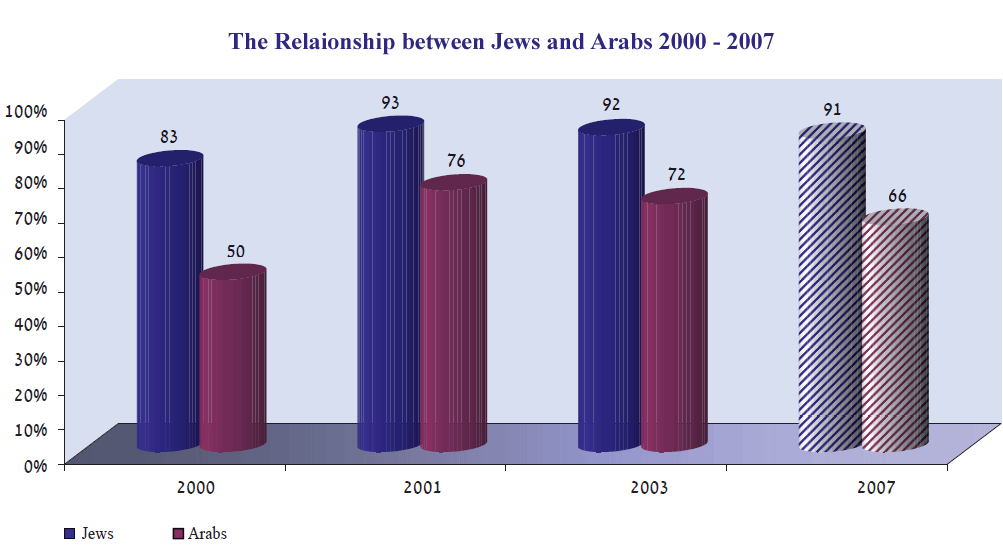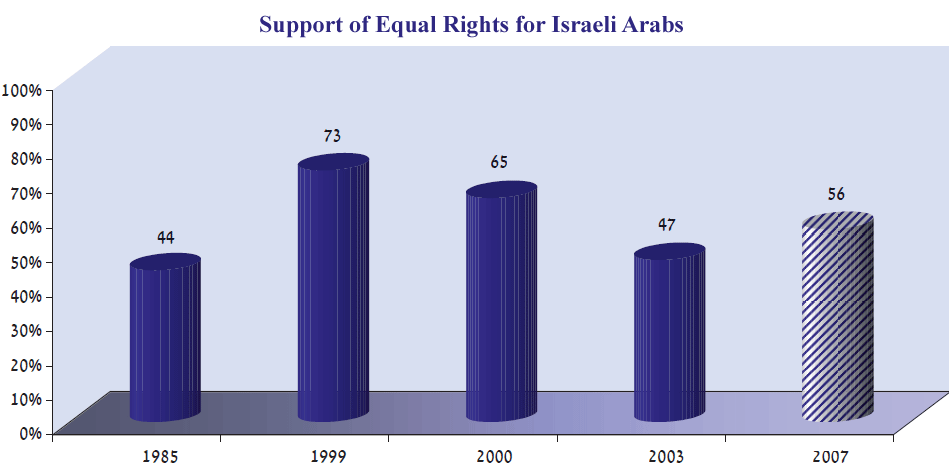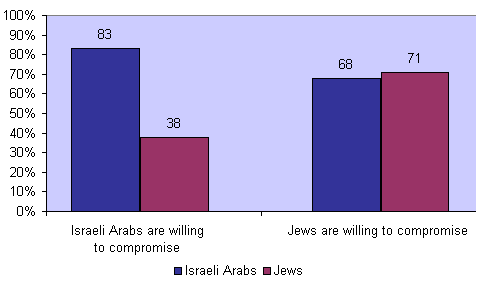Arab Identity in a Jewish and Democratic State
IDI researcher Karin Tamar Shafferman calls for a reexamination of the relationship between Arabs and Jews in the State of Israel and an exploration of the way Israel's Arabs define themselves, in order to determine whether the equality that Ben-Gurion spoke of upon founding the State has been achieved.
Introduction
—The Declaration of the Establishment of the State of Israel "
In this historic speech, Ben-Gurion declared that the newly-formed State of Israel intends to accept Arab residents within its borders as full-fledged citizens. From that day onwards, Israeli democracy has had to cope with the delicate task of preserving the rights of non-Jewish minorities (some 24% of the population), without compromising Israel's definition as a "Jewish State;" that is, to contend with the state's dual "Jewish and Democratic" identity. But the Jewish majority is not the only group which is divided between two worlds. Israeli Arabs also have a dual identity – some define themselves as Palestinian, some as Israeli, and some as Israeli Arabs.
Today, on the eve of Israel's sixtieth anniversary, is a time to reexamine the relationship between Arabs and Jews in the State of Israel, to look at the ways in which Israel's Arabs define themselves, and to ask whether the equality of which Ben-Gurion spoke has already been achieved.
Historical Background
In order to achieve a better understanding of the relationship between Jews and Arabs in the State of Israel, as well as Israeli Arabs' complex identity, one must consider the different periods in which they were fashioned:
- The War of Independence – This war is remembered differently by Jews and Arabs, and each group actually has a completely separate narrative, relying on separate sets of facts, statistics, and interpretations. As far as the Jewish narrative is concerned, most of the Palestinian refugees fled of their own free will, whereas Arabs claim that most of the refugees were driven out of their homes. In any case, following the ceasefire that ended the war, there were 160,000 Arabs left residing in Israel, whose status had been changed from a majority to a minority. They were considered by the Jewish population as a "fifth column", and were entirely cut off from the rest of the Arab world. These conditions have had a major effect on Jewish–Arab relations in Israel.
- The Military Regime of 1949–1966 – In this period, Israeli Arabs were subject to all sorts of limitations, which regulated their freedom of speech, transportation, and monetary assets. In addition, the Military Regime dealt with individual tribal leaders and prominent Hamula members, thus ignoring any collective Israeli-Arab identity and preventing the development of a political entity that could represent the Arabs as one unified group.
- Economic and Political Development followed the dismantling of the Military Regime in 1967 and the removal of the restrictions and regulations which had limited Israel's Arabs. The level of education improved greatly in this period of time, and the Arabs learned Hebrew and began to lead a more modern lifestyle. The Arab society in Israel became much more politically involved, and the traditional Muchtar leadership was replaced by a national leadership, with high levels of political awareness. The Arabs came forward with their own political demands – equal government funding, working to minimize socio-economic gaps between Jews and Arabs, and resistance to the expropriation of Arab lands by the government. These years also led to a major change in Arab voting patterns, which first moved from supporting Mapai satellites to the communist party, and later to national Arab parties, such as Albalad and Raam.
- The Formulation of an Arab-Palestinian Identity – On June 24th 1987, the Arab leadership decided to declare an all-inclusive strike, titled "The Day of Equality", and protesting inequality in the realms of education, construction, budget, health and social welfare. After the first Intifada broke out, the Arab leadership declared a second strike, titled "The Day of Peace", protesting the IDF's use of force and showing support for the Palestinian population. In October 2000, concurrent with the al-Aqsa Intifada, Israeli Arabs held a number of violent protests throughout the country. These protests, also known as "the October Events", went on for three days and included rallies, road-blocking, and stone-throwing. The Or committee, which was appointed for the purpose of looking into the Events, pointed out several reasons that led to their outbreak – including the discrimination against Arab citizens, as well as religious and political extremism and violence, which became an integral part of the Palestinian struggle and those identifying with it. Since then the situation has cooled down, but the memory of the October Events will not be easily forgotten.
The Relationship between a Majority and a Minority
According to Smooha, there are six key factors that affect the relationship between the Jews and the Arabs in Israel:
- Jewish Dominance – The Jewish population built Israeli society and structured it according to its own specific insight and needs. The Arab minority, on the other hand, joined an existing society as a defeated minority. Therefore, the Arab population is inferior in the Israeli social structure, when it comes to the distribution of resources and policymaking.
- Arabs' Link to the Palestinians and Arab Nationality – The ethnic roots, language, culture, and historical point of view of Israeli Arabs were all identical to their Palestinian counterparts until 1948. Therefore, they are loyal to Palestinian nationality, and many of them see their destiny as one they share with the Palestinians.
- Islam – Religious views rarely limit themselves to lifestyle, and in the case of Arab Israelis, often affect their position towards the state and the Jewish majority. We can witness this development in the founding of Islamic political parties.
- National Security – The complex link of Israel's Arabs with the Palestinians arouses suspicion among many Jews in Israel, and some see them as enemies. This is the reason for regulations and constraints to which Israeli Arabs are subject, which are meant to thwart the threat they supposedly pose to national security.
- The Definition of Israel as a Jewish and Democratic State – Zionist ideology maintains that Israel is "the home of the Jewish People"; the dominant language is Hebrew language; and its institutions and laws are of Jewish disposition. For example, the Law of Return applies only to Jews and not to Arabs.
- Democracy – The state of Israel is committed to democracy, and therefore grants its Arab population, which is a religious, cultural and lingual minority, special individual rights and special group rights.
All of the above shape the relationship between Jews and Arabs, and one should note that of all six factors, only Democracy works to bridge the gap between Jews and Arabs, whereas the rest push both sides further and further away from each other.
How do Jews and Arabs Evaluate Their Relationship?
Data collected in the Israeli Democracy Index show that the relationship between Jews and Arabs is not good, according to both groups (see figure 1). What is also clear is that Jews are much quicker to rate the relationship as bad than Arabs: in 2000, 83% of Jews said that the relationship between Jews and Arabs is not good, as opposed to 50% of Arabs. After the October Riots of 2000, there was an increase in the rate of those who assessed the relationship as not good (93% of Jews and 76% of Arabs). The numbers stayed quite static for some years, but in the 2007 Democracy Index, only 66% of Arabs evaluated the relationship between Jews and Arabs as less than good. The discrepancy between the percentages of negative raters amongst Jews and Arabs could very well stem from the fact that the Jews perceive the Arabs as disloyal; moreover, since they are mostly unfamiliar with the Arab population, base most of their opinions on the media. The media usually focuses on the negative aspects of Jewish-Arab relations, and usually describes the Arab population in a particularly negative fashion, while the Jewish population is often presented as much more humane and enlightened. This may also stem from stereotypes – 75% of Jews think Arabs have a tendency towards violence, and 55% think Arabs are incapable of achieving the same cultural level that characterizes the Jewish population.
Figure 1: The Relationship between Jews and Arabs 2000 - 2007 (Not good or Not good at all; in percentages)

Whereas many more Jews than Arabs are of the opinion that the relations between Arabs and Jews are not good or not good at all, when it comes to the public's view regarding discrimination – the numbers are reversed. Eighty percent of the Arab population agrees that they are discriminated against in comparison to the Jews, as opposed to just 55% of Jews who agree that the Arab population is indeed discriminated against.
As to a process of fully normalizing Arab rights and creating true equality between the groups, 56% showed support (figure 2). This number is an increase from 2003 (when only 47% supported the idea), but still very low compared to the levels of 1999 and 2000 (73% and 65%, respectively). Some 50% of Jews justify the discrimination against Arabs based on Israel's definition as a Jewish and Zionist state.
Figure 2: Support of Equal Rights for Israeli Arabs (among Jews; in percentages)

The data that describes how the Arabs feel about Israeli Democracy is also somewhat paradoxical. On the one hand, one-quarter of them say that they themselves oppose Israeli democracy – 24% say they are opposed to Arab parties joining the government, and 22% say that they oppose equal rights between Jews and Arabs. In other words, nearly one quarter of Israeli Arabs deny the possibility that Israeli Arabs become a part of Israeli democracy. Perhaps this resistance stems from a refusal to recognize Israel as a legitimate political entity, which leads to a refusal of full and equal rights. This position may relate directly to a different position – as long as Israel is perceived as the oppressor of the Palestinians, Israeli Arabs may not want to belong to Israeli society. The opposition to equal rights could also stem from the fear of equal responsibilities, including an obligatory national or military service.
On the other hand, many Arabs complain about the impotency of Israeli democracy. Thirty-one percent claim that freedom of speech is limited, in comparison with other democracies, as opposed to 19% of Jews. Almost one-half of the Arabs polled (46%) said that human rights are not protected as much as in other democracies, as opposed to 34% of Jews. As to their opinion regarding the situation in Israel, 64% of both Arabs and Jews said they definitely want to continue living in Israel, and 74% of Arabs said that they are concerned as to the future of the State of Israel.
Arab Identity in Israel
One could point out two main components of which Arab Israeli identity is comprised. The first is the civic component, involuntarily stemming from their status as Israeli citizens. The second component is the national one, stemming from their association with the Palestinian national movement and the Arab community. These two aspects of Arab Israeli identity are seen by some as incompatible – i.e. strengthening the national aspect will necessarily weaken the civic one. Others claim that despite the obvious conflict, there is not necessarily a contradiction between the two.
The findings from the 2007 Democracy Index show that 31% of Israeli Arabs are proud to be Israeli (as opposed to 85% of Jews), and 34% said they feel very much a part of the state of Israel and its problems (as opposed to 64% of Jews). The obvious conclusion is that only one-third of Israeli Arabs see themselves as a part of the State of Israel, and the same number see Israel as a major part of their own individual identity. Thus, Arab identity in Israel is complex, oscillating between isolation (the national component) and empathy towards the State of Israel (the civic component).
Arab Identity in Israel
Considering the majority–minority relationship between Jews and Arabs in Israel, and considering the Israeli Arabs complex identity issues, one may ask: will the Jews and the Arabs be able to find common ground?
As to the willingness of the Jews to compromise with the Arabs, 71% of Jews and 68% of Arabs think that the Jews are willing to compromise. But as to the Arabs' willingness, only 38% of Jews, as opposed to 80% of Arabs, think that the Arab population is willing to compromise with the Jewish one.
Figure 3: "In your opinion, how willing are the members of the group to compromise in order to reach an agreement which will allow everyone to live here together?" (Somewhat or Very much; in percentages

The huge discrepancy shows once again that the Jewish population does not have in-depth knowledge of the Arab population and that communication between them is lacking. This lack strengthens stereotypes and perpetuates the fanatic image of Arabs held by many Jews.
The relationship between Jews and Arabs is indeed very complex – the Arabs wish to define their collective identity within the framework of Israeli society, which is Jewish by default, and yet at the same time democratic, allowing the Arab population to struggle for their right to equality.
Related Resources
- All figures in this article are taken from the 2007 Israeli Democracy Index.
- For the bibliography of Hebrew sources used for this article, see the Hebrew page.
- For a study of Israeli-Arab voting patterns, see "Social Identity and Voter Turnout" by Momi Dahan and Avi Ben-Bassat.
